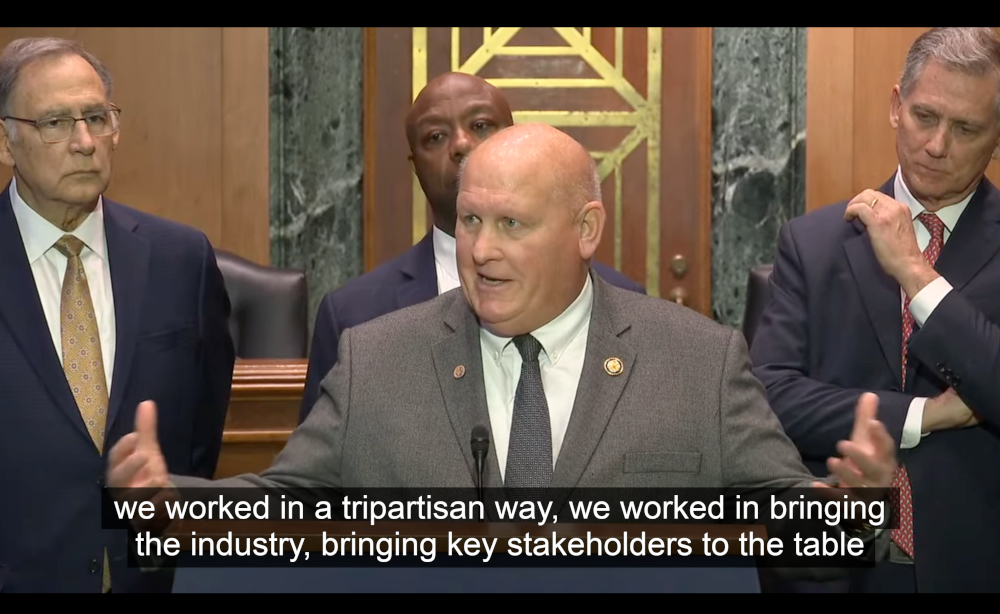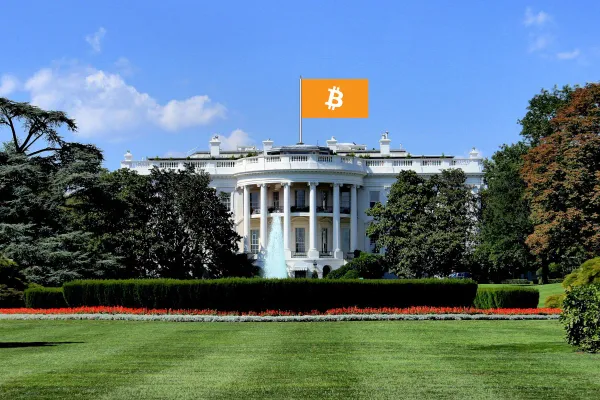Issue 76 – Tripartisan legislation
Crypto exchanges face legal troubles, and Trump’s crypto empire grows as regulations are slashed and enforcement is sidelined.


It is a profoundly weird feeling to outline all of the goings on in the crypto world right now, which range from the highly important — such as US lawmakers working to dismantle anything that might prevent massive financial contagion from another crypto collapse — to the vaguely amusing — such as a “quantum-enhanced AI” project raising a bunch of money by allegedly just slapping some monochrome artwork on a pseudorandom number generator [W3IGG]. As Elon Musk and his alpaca-haired gaggle of 20-year-olds without any apparent vetting or clearance push changes straight to production in the Treasury (and the Treasury Secretary continues to insist they have “read-only” access) and Trump suggests the US “take over” the Gaza Strip and Democrats advance RFK Jr.’s HHS Secretary appointment because they’ve decided doing any real legislating would get in the way of their re-election ambitions, I wonder if my time might be better spent going off-piste again (as I did last week in my story exposing the Trump loyalists writing OMB memos).
But I think regular readers of this newsletter will understand how inextricably linked the crypto industry is to our current circumstances, and how deeply they will continue to be linked, and how important it will be for people to understand what is happening in this world. And I hope new readers just joining will understand very soon, thanks to my ongoing work in this space.
A BlueSky user named borderless wrote a great thread today that reached me at just the right time: “Y’all pick a lane. Then make a little progress in your lane each day.”
In the courts
France has opened a probe into the Binance cryptocurrency exchange to examine money laundering, tax fraud, and other charges. Much like the criminal case in the United States, which examined Binance’s early years of operation, French investigators are looking as far back as 2019 to review Binance’s activities. Unlike the US case, which looked at illicit activity up until mid-2022, French investigators are reportedly reviewing much more recent potential infractions dating up to 2024. That hasn’t stopped Binance from waving off the investigation as “several years old”, and Binance has denied all dethe allegations.1
Stemming from charges filed back in March 2024 [I54], KuCoin has pleaded guilty to violating US anti-money laundering laws. They will pay a $300 million fine and withdraw from the US for two years. Two co-founders of the company who were personally charged have reached deferred prosecution agreements, which include them leaving the company and paying $2.7 million in fines apiece [W3IGG]. This is only the most recent development in KuCoin’s history of legal woes. The case filed by the CFTC alongside the DOJ’s criminal charges still remains ongoing. Prior to that, the company had paid a $22 million fine in a case brought by the New York Attorney General in 2023 [W3IGG], and $2 million in a case brought by Canadian securities regulators in Ontario in 2022 [W3IGG].
A 22-year-old Canadian man named Andean Medjedovic has been indicted on wire fraud, hacking, extortion, and money laundering-related charges in connection to his alleged hacking of both the Indexed Finance defi protocol in October 2021 [W3IGG] and the KyberSwap decentralized cryptocurrency exchange in November 2023 [W3IGG]. He was identified all the way back in October 2021, when he was 18, when he stole $16 million from Indexed Finance. Even after he was identified, he refused to return the funds, insisting that “code is law” and that the users of Indexed Finance had merely been “out-traded. There is nothing you can do about that.” When Medjedovic was summoned to a court in Canada, he never showed. In 2023, Medjedovic struck again with a $50 million theft from KyberSwap. This time, he took it a step further, issuing a list of demands which included “complete executive control” over the company and the “surrender of all ... assets”. He signed the missive “Kyber Director” [I45]. Unfortunately for him, this added stunt seems to have been what earned him an additional extortion charge. If convicted, Medjedovic is potentially facing serious time, with 20-year maximum sentences on four of the five charges.2
Sam Bankman-Fried’s parents are looking into acquiring a presidential pardon for their son, according to Bloomberg.3 I guess they might as well, but it seems somewhat unlikely to me that this will go anywhere. For one, despite the fact that Bankman-Fried’s political donations were a lot more bipartisan than generally believed (due to his dark money or straw Republican donations), he is still generally perceived to be a primarily Democratic megadonor — something that’s not likely to endear him to Trump. Secondly, while the crypto industry is already cashing in on the favors they’ve bought with Trump, an SBF pardon is not likely to be among them. While he was once a figurehead of the crypto industry, there is no “Free SBF” campaign within the crypto world, which largely resents him for damaging whatever reputation they believe they once had.
A second class lawsuit has been filed against the pump.fun memecoin platform, joining another that was filed in mid-January [I74]. Much as the first lawsuit involved trades of the PNUT token, themed around MAGA cause célèbre Peanut the squirrel, this lawsuit focuses on a memecoin themed around Peanut’s lesser-known but similarly ill-fated roommate: a raccoon named Fred. The most recent case also names the tokens FWOG and GRIFFAIN.4

The plaintiff in the second suit is represented by some of the same legal team as in the first, and the complaint makes similar allegations. There is a bit of a weird twist here, though: in order to illustrate its claims around how easy it is to create a memecoin, law firm Burwick Law appear to have created a memecoin of their own. Exhibits submitted alongside the lawsuit show screenshots of a wallet creating a token called “Dog Shit Going Nowhere”, or $DOGSHIT2, with the description “Don’t buy this coin”.5 Eagle-eyed crypto degens have, of course, tried to pump the token price. However, Burwick Law’s managing partner has denied actually creating the token, stating that the “token concept” was only “memory on the server”.6
Seven people have been charged in a series of kidnappings and violent attacks on a single victim, who was forced to transfer £100,000 (~$125,000) in cryptocurrency across five separate attacks in the span of a year. The man was repeatedly threatened with violence and forced to transfer money. In the third attack, he was kidnapped and assaulted until he sent more money. He went on to be kidnapped twice more, and in the last incident was held for several days. He had been tied up, burned, and beaten. The seven people were convicted and sentenced to prison terms of between roughly two and twenty years.7
In bankruptcies
Crypto casino Zero Edge seems to be in the running to break records for the shortest time between raising millions of dollars in seed funding and having to shut down. Company liquidators have accused founder Richard Kim of “misappropriating” most of the $8.3 million the company raised in seed investments and token sales. A day after the company closed its seed financing round in June 2024, Kim had put millions of dollars into leveraged long bitcoin positions. When bitcoin prices took a dive that month, all was lost. Kim admitted what he had done, claiming that it all began when he lost $80,000 to a phishing website. “This triggered my old demons, the need to ‘make it back’ to preserve my reputation. ... [I] started down a negative spiral of leverage trading, raising more capital, and hiding the truth. ... By the seed round’s close, I was ready to rebuild, to start fresh, putting past demons aside. But the moment I received the proceeds, something snapped. I felt compelled to make up for my missteps. Within days, millions were in leveraged longs. When bitcoin crashed, I experienced a complete wipeout.” Although Kim told a crypto media outlet at the time that he had self-reported to the SEC tipline, and that he “didn’t intend to go run away with this money”, company liquidators have accused him of misappropriating the funds and then “disappearing” [W3IGG].
In governments and regulators
Robinhood, Crypto.com, and Kalshi might be in hot water with the CFTC after announcing they intend to launch “event contracts” pertaining to the outcomes of the Super Bowl on their “derivatives markets”. “With an emerging asset class like event contracts, we recognize an opportunity to better serve our customers,” said Robinhood in a statement announcing the launch — which was followed a day later by another announcement that they would be suspending the offering at the CFTC’s request.89 Personally, I’m impressed at the branding exercise happening here. “Sports bets” are now “event contracts”, and “gambling” is now “an emerging asset class”. They seem to be taking lessons from the cryptocurrency industry, who have termed “ignoring financial regulations” as “economic innovation”. Perhaps the next pickpocket to be caught by police should try informing the officer that they’re merely democratizing finance!
El Salvador’s Congress has signed off on a request from President Bukele to drop bitcoin as legal tender in the country. This is a remarkable about-face by vehemently pro-bitcoin Bukele, who pushed the asset on the country in 2021 despite little interest from the public. His changed stance is thanks to the International Monetary Fund (IMF), who responded to Bukele’s bitcoin policies by downgrading El Salvador’s credit rating, and whose $1.4 billion in credit to the country was contingent on changes to limit its bitcoin-related activities [I72].
In US politics
Crypto press conference
America’s new “AI and Crypto Czar” David Sacks headed up a crypto-focused press conference on Tuesday, in concert with the Senate Banking Committee and several Representatives.10 The crypto world reacted with some disappointment to those they were only recently so excited about, seeming unimpressed that these politicians were merely announcing future announcements rather than unveiling anything that would immediately pump their bags. “This [crypto-focused presidential working committee] might need to be DOGE’d as well”, remarked one popular crypto Twitter account (and frequent retweetee of Elon Musk).11
For all of the crypto industry money that poured into installing crypto-friendly Congresspeople this time around, the speakers at the press conference mostly described their plans to push forward crypto-related market structure and stablecoins bills that will look a lot like what was on the table during the last administration. FIT21 is back [I58, 59], although the complaints from last summer from some of the crypto industry that their regulatory windfall was not friendly enough [I60] will likely resurface in front of this new, obsequious group. Speakers at the press conference made no secret of the degree to which they intend to let the cryptocurrency industry write the rules, with Congressman GT Thompson (R-PA) boasting that they would continue to work in a “tripartisan way” with Republicans, Democrats, and the crypto industry.
Senators Hagerty (R-TN), Scott (R-SC), Gillibrand (D-NY), and Lummis (R-WY) have put forward a stablecoin bill, also announced Tuesday, called the “GENIUS Act”, short for “Guiding and Establishing National Innovation for U.S. Stablecoins”. I guess “Stable Genius Act” was already taken. It’s pretty similar to the stablecoin bill introduced last Congress by Lummis and Gillibrand, and similarly has very little in it that would safeguard consumers or address risks of financial contagion. This is treated as a selling point — the press release from the Senate Banking Committee promotes its “light-touch, tailored regulatory standards”.12
Cabinet confirmations
The Senate has confirmed pro-crypto Scott Bessent as Treasury Secretary, to replace Janet Yellen. Days after his confirmation, he was also tapped to replace Consumer Financial Protection Bureau director Rohit Chopra, who Trump unsurprisingly fired. Chopra wrote in a farewell letter that the CFPB is intended to “make sure the laws of our land aren’t just words on a page. Those laws are intended to check the enormous influence that powerful firms have over our daily lives. With so much power concentrated in the hands of a few, agencies like the CFPB have never been more critical.”13 Given that Bessent himself is a wealthy hedge fund manager, and that one of his first actions as Treasury Secretary was to sign off on granting Elon Musk and his gaggle of internsa access to the highly sensitive federal payments systems,1415 it was hardly unexpected to see Bessent immediately shut down work at the CFPB.16 It should be noted that as the crypto industry continues to protest “debanking” (or at least their crypto-focused definition of the termb),c they have been completely silent about the stoppage of work at the agency primarily in charge of preventing discriminatory consumer debanking.
The Senate Commerce Committee voted 16–12 to send Howard Lutnick’s nomination to a full Senate vote, with votes largely breaking down along party lines.17 He faced some scrutiny during his confirmation hearing over his substantial ties to the Tether stablecoin, mostly pertaining to its role in enabling criminal activity. “Our AI tools will rip illicit activity out of stablecoins within a year or two,” he said in response, which was hardly more convincing than if he had said “we expect a crimestopping magic wand to be dropped in our laps within a year or two”.18 As for the question of Tether’s years-long failure to produce anything resembling a proper audit, which Lutnick had previously waved off by personally vouching for the stablecoin’s backing, he actually backed down from those previous statements somewhat, saying: “Cantor Fitzgerald is not conducting continuous diligence on Tether’s financial statements, but I believe my statements were accurate when made.” Asked if he would publicly call for a Tether audit, Lutnick dodged the question entirely.19 I for one have never been more confident in the stability of the asset that props up the entirety of the crypto ecosystem.
SEC
Even before any confirmation of Trump’s nominee for agency chairman, the SEC is already working to fulfill its orders from the crypto industry. The New York Times has reported that the agency has reassigned some of the roughly fifty lawyers comprising its crypto-focused enforcement unit, which is tasked both with ensuring crypto companies comply with securities laws and going after fraud and other malfeasance in the markets they oversee.20 However, it seems to me that the SEC is also telegraphing that slashing the SEC’s consumer protection activities will likely have some unpleasant consequences. In a long statement by longtime crypto-friendly SEC commissioner Hester Peirce, who is now also chief of staff of the agency’s new “Crypto Task Force”,21 she tucked in a caveat emptor: “Spinning up coins and tokens is easy. If people want to buy a token or product that lacks a clear long-term value proposition, they should feel free to but should not be surprised if someday the price drops. In this country, people generally have a right to make decisions for themselves, but the counterpart to that wonderful American liberty is the equally wonderful American expectation that people must decide for themselves, not look to Mama Government to tell them what to do or not to do, nor to bail them out when they do something that turns out badly.”22 Whether she’s speaking about “bailouts” for individuals who actually buy various crypto tokens, or for the whole American financial system, will remain to be seen.
The SEC has not yet dropped ongoing enforcement cases against political megadonors like Coinbase, Ripple, and others, but the industry has already been acting in ways that suggest they believe they have impunity from enforcement actions going forward. As I noted two issues ago, Coinbase has already relaunched the borrowing program that the SEC had previously frowned upon [I74]. Now, Kraken has relaunched crypto staking services,23 which they shut down as part of a February 2023 settlement with the SEC that also saw them pay $30 million in fines [W3IGG].
Trump crypto projects
Trump’s World Liberty Financial project has found itself in hot water after Blockworks reported that the company has been approaching various blockchain projects with “token swap” deals where World Liberty Financial would agree to buy an equivalent amount of the token belonging to projects that bought $10 million or more of its WLFI tokens (sans a 10% fee). Recent revelations that World Liberty Financial has bought tokens including Justin Sun’s Tron project’s TRX token, Chainlink’s LINK, and AAVE have caused spikes in interest (and therefore price) in those various tokens, which might incentivize other projects to pursue similar deals. Some also seemed to hope this would earn their projects inclusion in World Liberty Financial’s upcoming trading platform.24
Eric Trump, President Trump’s son and a member of World Liberty Financial’s management board, pumped the price of ETH on February 3 when he tweeted “In my opinion, it’s a great time to add $ETH. You can thank me later.” He tweeted this shortly after, in what I’m sure was a totally unrelated move, World Liberty Financial moved a substantial number of ETH tokens to Coinbase Prime, where they would stand to earn more money if the ETH price just so happened to spike around that time. (World Liberty Financial has denied that they were selling tokens.)25 Not long after making his post, Eric Trump removed the “You can thank me later” portion — but not before various influential crypto figures remarked on the blatant pump attempt. “they’re gonna have to come up with a new word for market manipulation after this cycle is over”, commented crypto influencer Ansem later that day.26
Trump-themed and -owned memecoins $TRUMP and $MELANIA — whose websites insisted they were nothing more than “digital collectibles” or “an expression of support for... the ideals and beliefs embodied by” their tickers — are now being accepted as payment on several stores for Trump-branded products including fragrances and sneakers.27 Sadly for holders, their tokens will buy them somewhere between 1/4 and 1/5 as many of the $200 “Trump for Men” and “Trump for Women” colognes and perfumes as they once might have, as the token prices have slumped considerably since the memecoin announcements.
Trump apparently can’t get enough of crypto, because in addition to these two projects, one of his companies is planning to launch a third. Trump Media and Technology Group, the publicly-traded company behind the Truth Social platform, has announced it will be launching a “financial services and fintech brand” called Truth.Fi, which will be focused on “American First investment vehicles”, “investment products and decentralized finance”. “Developing American First investment vehicles is another step toward our goal of creating a robust ecosystem through which American patriots can protect themselves from the ever-present threat of cancellation, censorship, debanking, and privacy violations committed by Big Tech and woke corporations,” said Trump Media CEO and Chairman Devin Nunes.28 Yes, that Devin Nunes — the CEO of Trump’s “free speech platform” is the same former Congressman known for filing bogus SLAPP suits against perceived enemies and critics, including against a parody Twitter account named “Devin Nunes’s Cow”.
Everything else
Musk is reportedly “exploring blockchain technology” for use in both his Department of Government Efficiency and at the Treasury,29 because what could contribute more to government efficiency than securing lucrative contracts for your crypto donors to implement inefficient technology that is uniquely suited to solving problems you don’t have?
The crypto advisory council, led by Bo Hines [I72, 74], will presumably take shape soon. According one hopeful quoted by the New York Post, “everyone and their mother is begging” for a spot. Those rumored to be on the shortlist include crypto megadonor Brian Armstrong of Coinbase, as well as executives from other crypto exchanges and crypto-related companies.30 I’m sure the list of consumer protection advocates and more crypto-skeptical voices also being considered for the council will drop any day now...
In elections and political influence
Fairshake is fundraising for the midterms, pulling in multi-million dollar donations from the likes of Jump Crypto to add to the nine-figure war chest they’ve already been preparing from the usual suspects (Coinbase, Ripple, and Andreessen Horowitz). Although the midterm elections are still two years away, I think Fairshake is sending a clear signal to Congresspeople who will be up for re-election: “support the cryptocurrency industry’s policies, or you’re out in 2026.”31
The revolving door is swinging fast, and former Arizona Senator Kyrsten Sinema has joined the long list of former Congresspeople and other government officials to lend their names to Coinbase’s Global Advisory Council. Trump adviser Chris LaCivita is also on their roster now.32
The Web3 is Going Just Great recap
There were nine entries between January 23 and February 5, averaging 0.6 entries per day. $318.97 million was added to the grift counter.
Coinbase accused of allowing $300 million a year in social engineering attacks on its customers
[link]
Renowned crypto sleuth zachxbt has accused Coinbase of “fail[ing] to stop its users losing $300M+ per year to social engineering scams”, identifying $65 million in thefts from Coinbase users in the past two months alone. He acknowledged that the “number is likely much lower than the actual amount stolen as our data was limited to my DMs and thefts we discovered on-chain which does not account for Coinbase support tickets and police reports we do not have access to.”
Many of the Coinbase thefts are perpetrated by scammers impersonating Coinbase support staff, who call victims and claim that their accounts have been compromised, then convince them to transfer their tokens to the scammers’ own wallets. Coinbase does very little to try to thwart these types of attacks on their customers, and what little protections they have attempted to put in place seem to more frequently than anything lock legitimate users out of their accounts.
Lack of customer care by crypto companies is hardly a rare sight in the crypto world, as I wrote recently: “crypto platforms that receive complaints from customers whose accounts were emptied typically shrug and say ‘guess you shouldn’t have fallen for a scam’, then refer them to local law enforcement who in turn shrug and say ‘we can’t trace stolen crypto’.” [I74]
Who rugpulls the rugpullers?
[link]
Poor software security by the developers of a software library called “DogWifTools”, which helps memecoin creators pump-and-dump their tokens and fake trading activity, has resulted in scammers scamming scammers. Attackers were able to compromise the package to insert a remote access trojan (RAT), which they then used to exfiltrate crypto wallet private keys, login information, and scans of identification documents. Ultimately, around $10 million was taken from would-be scammers.
Along with the virus, the people who compromised DogWifTools left an angry note on infected machines: “Solana is a fucking joke and a scam from the beginning, it was designed for criminals by criminals! As a result, we have confiscated all your crypto, because you deserved it!” They also published a manifesto on an onion site, explaining: “We specifically targeted scammers in the crypto market who were using tools to gain an unfair advantage over innocent, day-to-day traders. ... We believe it was morally correct to confiscate money that was not rightfully theirs.”
Everything else
- AlleyCat project developer takes presale money to fund gambling habit [link]
- Dogwifhat memecoin lies about deal to put the meme on the Las Vegas Sphere after raising $700,000 to pay for it [link]
- Tsotchke "quantum-enhanced AI" crypto project appears to be based on lies [link]
- Newly freed Silk Road founder Ross Ulbricht appears to squander $15 million in potential memecoin profits [link]
- "On-chain Microstrategy" clone Ether Strategy loses over $500,000 of ETH [link]
- KuCoin pleads guilty, pays nearly $300 million fine in criminal case [link]
- Zero Edge crypto casino enters liquidation after founder gambles away its seed money [link]
Worth a read
Shoutout to Mike Brock, and TechDirt, for being among the first to not mince words about what Elon Musk and his allies are doing, and call it a “coup”. Brock writes, “This is an emergency, and it demands emergency response from every American with power or influence. The window for effective resistance narrows with each passing day. History will judge harshly those who had the capacity to resist but chose instead to wait and see how things develop. The time to act is now, before the mechanisms that would allow effective resistance are completely dismantled.”
Others who have told it like it is, and provided excellent journalism in addition to their accurate nomenclature, are Marisa Kabas of The Handbasket, Parker Molloy of The Present Age, and Jeet Heer in The Nation.
If you’ve found yourself thinking “why isn’t anyone doing anything” lately, consider this: some of the owners of the biggest news media in the United States have publicly bowed to pressure or sought favor with Trump. It is in their interests not to report on resistance to his and his administration’s abuses, because it contributes to a feeling among opponents that they are alone, and that they can’t possibly do anything to push back as just one person.
Rather than looking to some of the biggest outlets in the mainstream media, find hope in some of these publications, who have been doing really exceptional journalism in the recent week (and beyond):
- TechDirt, which I mentioned above, and which also published Mike Masnick’s “First Cracks Appear: Some Conservatives Admit We’re In A Constitutional Crisis”
- Marisa Kabas’ and The Handbasket, an independent journalist who broke the story on the Federal spending freeze
- Wired, a well known tech publication that has really stepped things up to report on Elon Musk’s weird cohort of practically children
- 404 Media, an incredible indie newsroom that has recently published pieces like Janus Rose’s “You Can’t Post Your Way Out of Fascism”
In the news
If you want an under ten-minute recap of the $TRUMP memecoin and why Trump is not suddenly worth $50 billion because of it, I went on the BBC’s More or Less podcast: “Did Trump make billions with his meme-coin?” I’m also quoted in some Trump memecoin-related coverage in Jacobin and Sludge.
I spoke about Wikipedia with Columbia Journalism Review for the article, “The Right Takes Aim at Wikipedia”, and I’m also quoted in Stephen Harrison’s “A Powerful Conservative Think Tank Is Targeting One of the Last Good Things on the Internet” in Slate.
That's all for now, folks. Until next time,
– Molly White
I have disclosures for my work and writing pertaining to cryptocurrencies.
Footnotes
Musk seems to have had one clear thought among all this: if you want to find a demographic that’s likely to do what you say without question, pushback, or whistleblowing, get a bunch of very young, starry-eyed Musk fans who haven’t even had to pay their own rent yet. ↩
I will note that, as is perhaps to be expected in an industry so fond of shifting definitions to support their narratives, the crypto industry seems to now be suggesting that banking regulators informing banks that they are not permitted to themselves launch crypto projects is “debanking”. ↩
As I finished writing this newsletter on February 5, the FDIC released over 700 pages of documents pertaining to crypto-related banking guidance. If discussion of that seems conspicuously absent in this issue, it’s because I would likely need to hold the newsletter for quite some time while I read these and watch the associated Senate hearing, so I am leaving this for another issue. ↩
References
“French investigators open fraud probe against crypto platform Binance”, Reuters. ↩
“Canadian Man Charged in $65M Cryptocurrency Hacking Schemes”, Office of Public Affairs for the US Department of Justice. ↩
“Sam Bankman-Fried’s Parents Explore Seeking Trump Pardon for Son”, Bloomberg. ↩
Class action complaint filed on January 30, 2025. Document #1 in Aguilar v. Baton Corporation Ltd., d/b/a Pump.fun. ↩
Exhibit C filed on January 30, 2025. Document 1-4 in Aguilar v. Baton Corporation Ltd. d/b/a/ Pump.fun. ↩
“Law firm that sued Pump.fun is being linked to a $23M ‘DOGSHIT2’ coin”, Cointelegraph. ↩
“Crypto gang jailed for over 76 years after kidnapping and torture in a $124,000 extortion plot”, The Block. ↩
“Crypto.com, Kalshi’s Super Bowl Wagers Probed by US Regulator”, Bloomberg. ↩
“Robinhood Receives Formal Request from the CFTC to Roll Back the Pro Football Championship Market”, Robinhood. ↩
“Scott, Hagerty, Lummis, Gillibrand Introduce Legislation to Establish a Stablecoin Regulatory Framework”, United States Senate Committee on Banking, Housing, and Urban Affairs. ↩
“Warren Questions Bessent Over Musk Access to Treasury Payment System”, New York Times. ↩
“The Young, Inexperienced Engineers Aiding Elon Musk’s Government Takeover”, Wired. ↩
“Treasury Secretary Bessent, tapped to run CFPB, orders staff to halt work”, NPR. ↩
“Senate panel advances Commerce nominee Howard Lutnick”, Axios. ↩
“As Lutnick Faces U.S. Senate, Elizabeth Warren Scrutinizes His Tether Ties”, CoinDesk. ↩
“Howard Lutnick Softens Stance on Tether Stability, Investment Ties”, CoinDesk. ↩
“S.E.C. Moves to Scale Back Its Crypto Enforcement Efforts”, New York Times. ↩
“Acting SEC Chair Uyeda Names 3 Appointees to Agency’s New Crypto Task Force”, CoinDesk. ↩
“The Journey Begins”, SEC Commissioner Hester Peirce. ↩
“Kraken Brings Back Crypto Staking for U.S. Customers”, CoinDesk. ↩
“Trump-backed World Liberty Financial courts crypto teams for token swaps”, Blockworks. ↩
“Eric Trump removes ‘thank me later’ from ETH promo”, Protos. ↩
“Trump and Melania memecoins make push for real-world payments in fragrances, sneakers and travel”, The Block. ↩
“Trump Media Announces Expansion into Financial Services”, press release by Trump Media and Technology Group. ↩
“Musk Exploring Blockchain Use in US Government Efficiency Effort”, Bloomberg. ↩
“Everyone in crypto is ‘begging’ for a spot on Trump’s new advisory council”, New York Post. ↩
“Why Congress might actually get something done on housing”, Politico. ↩
“Exclusive: Former Senator Kyrsten Sinema Joins Coinbase’s Global Advisory Council”, The Wall Street Journal. ↩




